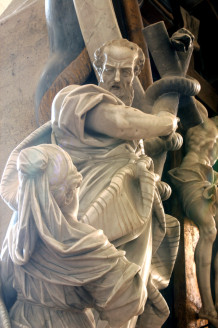The following comes from the Catholic Exchange:
The prophets are among the oddest and most eccentric characters of the Old Testament.
That might actually be an understatement. Put bluntly, the behavior of Old Testament prophets was so bizarre that by today’s secular standards of sanity they would end up institutionalized, or, at the very least, in some form of intensive therapy.
Consider Isaiah, who stripped off all his clothes and wandered around naked (Isaiah 20). Or Jeremiah, who not only hid his underwear in a rock but then went back to retrieve it after a “long time” (Jeremiah 13). Jeremiah apparently didn’t mind parting with under garments, but he couldn’t be separated from the cattle yoke he had fastened to his shoulders until another prophet broke it off (Jeremiah 27 and 28). Yet another eyebrow-raiser was Hosea, who married a prostitute and named their daughter Lo-ruhama, which means ‘unloved’ (Hosea 1).
Then there was Jonah, the run-away prophet who spent three days in the belly of a whale before answering God’s call. When he eventually got around to preaching in Nineveh, the entire city repented. For any other preacher this would have been a joyous outcome. But Jonah—a prophetic Puddleglum if ever there was one—was so upset that his doomsday prophecy wasn’t fulfilled that he begged God to kill him, a request that went unanswered.
Jonah then went into denial. Convinced that a local apocalypse was still in the works, he left the city and picked a vantage point from which he might safely watch the whole fire-and-brimstone show. Jonah had no pity for the Ninevites, but when a small bush that had been sheltering him from the scorching-hot sun died, he went berserk, asking God once again to just end his misery.
But the weirdest of the lot may be Ezekiel. After witnessing a vision of God flanked by four chimerical creatures, the prophet ate a scroll that had been given to him (Ezekiel 1 and 3). Ezekiel was called to be a prophet, but his ministry initially did not involve any prophetic words, as God had rendered him mute (Ezekiel 3). Instead he took to drawing, depicting an image of Jerusalem under siege on a clay tablet. Then he lied down on his side, with an iron pan separating him from his clay art. After 390 days had passed, Ezekiel rolled over and repeated (Ezekiel 4).
After his clay tablet stunt was over, Ezekiel went new diet of barley cakes baked over cow manure (Ezekiel 4). Next Ezekiel used a sword—yes, you read that right, an actual sword—to shave off his beard, dividing his hairs into thirds. He set one third on fire. He scattered another third around the city and stabbed it with his sword. He threw the remaining third into the wind. But the hair histrionics were far from over: Ezekiel had saved a few hairs from such abuse, which he sewed into his clothing. Then he burned some of those hairs too (Ezekiel 5).
The weird stuff didn’t stop when Ezekiel finally started speaking. In Ezekiel 6, he prophesies against the mountains. Six chapters later, he goes into lurid detail—at least by biblical standards—about the sexual depravity of two sister prostitutes. Later, he prophesies over dry bones in a valley. As Ezekiel stands speaking to his captive audience, he has a vision of the bones coming to life (Ezekiel 37).
One crucial detail has been omitted in these accounts: the actions of Ezekiel, Hosea, Jeremiah, and Isaiah were commanded by God, which means that we cannot dismiss their behavior. Indeed, these men were not prophets in spite of their eccentricities. Rather, their actions were at the center of their ministry. In the Scriptures, they are explained as symbolic acts that convey divine messages along with their words. For example, the stripping of Isaiah symbolized the future humiliation of Egypt and Ethiopia at the hands of Assyrian conquerors. Jeremiah’s yoke signified the servitude of the Jews to Babylonia while Ezekiel’s dung-warmed meals foreshadowed their exile, where they would be forced to eat unclean food.
Jonah might seem an exception to all this, but God ended up using his wayward journey to symbolize Christ’s sacrifice and three-day descent into hell.
Looking back on Jonah and the others from the perspective of the New Testament we begin to see a sort of harmony between their bizarre behavior and their prophecies of both doom and deliverance. There is an incarnational logic to their ministries: these prophets were not just speakers of the word—they lived it out in their lives, through their actions, their choice of clothing, and even their very bodies. They are thus witnesses to how totally transforming and disruptive the Word of God can be when we let it consume our whole lives.
Now, this message may not have been as clear to the Jews of their day and those living in the centuries immediately afterwards. And the mystery of the prophets would have only deepened when all prophecy suddenly ceased with Malachi, ushering in 400 years of silence.
But, with the coming of Christ, we can look back at these prophets and see them as foreshadowing Him—not just through the prophecies that told of His coming, but through their prophetic actions. Christ was, after all, the Word Made Flesh in the fullest and richest manner possible. And, like the prophets, Christ’s behavior was utterly bizarre, disruptive, and confusing according to conventional social standards of the day. This was, after all, someone who promised to rebuild the temple in three days, dined with prostitutes and tax collectors, drove demons into a herd of swine, healed a blind man by rubbing mud in his eyes, and once walked on water.
It doesn’t get weirder than that.



















No comments:
Post a Comment